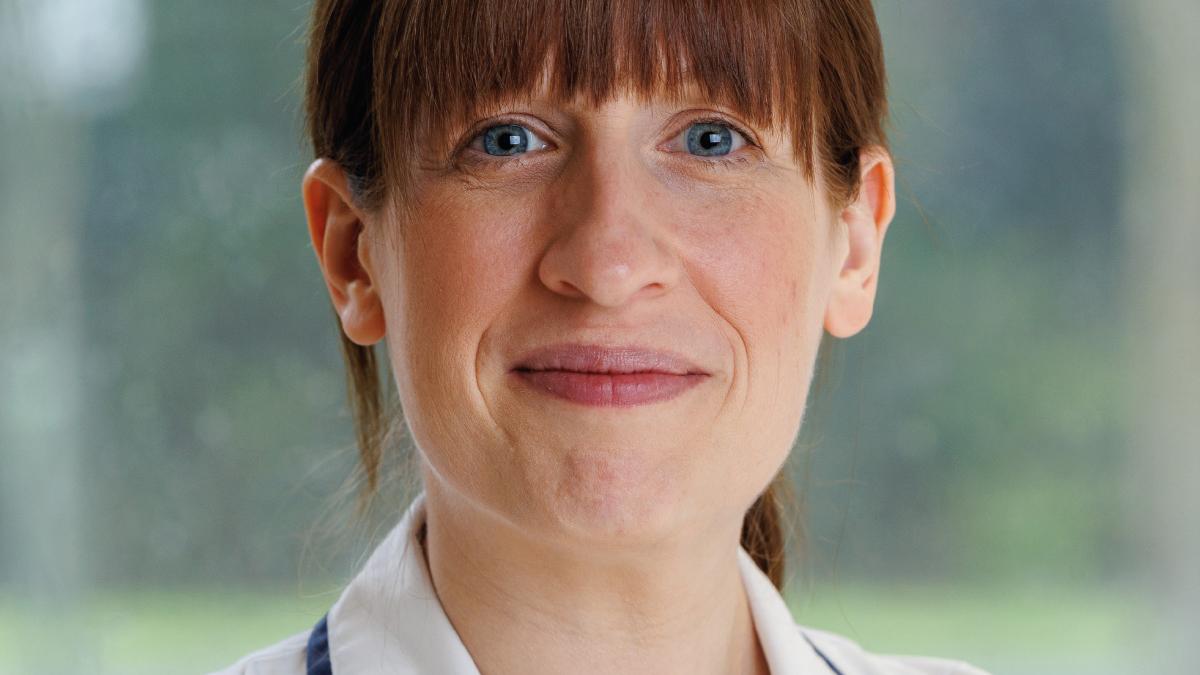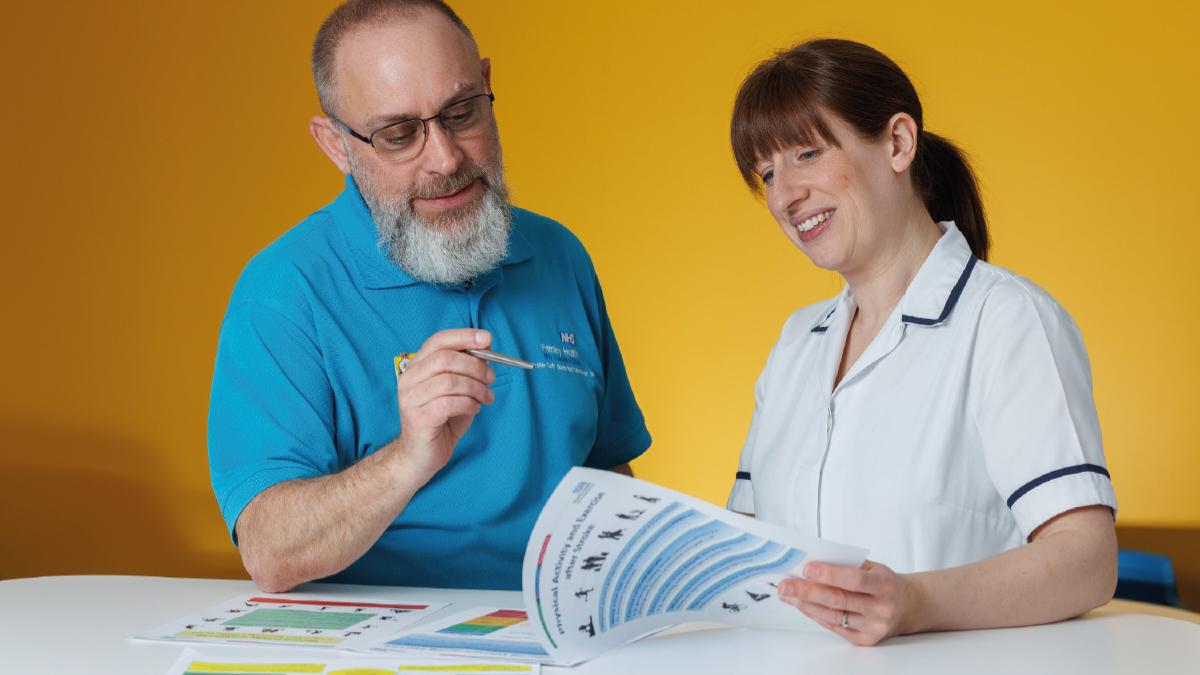Team leader physio Michelle Anderson reveals how taking part in a multiprofessional fellowship is one of the highlights of her career. Catherine Turnbull reports

Michelle Anderson is full of enthusiasm as she completes a year-long multi-professional fellowship with Brighton and Sussex Medical School. The team leader physiotherapist, who works in the Stroke Early Supported Discharge team at Frimley Health NHS Foundation Trust in Surrey, says that the project and post-graduate study has benefited her, her colleagues, and ultimately their patients.
As part of this fellowship, she completed a project titled, Increasing long-term engagement in exercise as secondary prevention following stroke and TIA.
‘There are many positive outcomes from the project, including the use of motivational interviewing by all healthcare professionals within our service, improved patient information, a robust medical checklist to complete to guide exercise, and collaboration with leisure services to improve exercise provision,’ she says.
Michelle has worked in stroke and neurology for more than 14 years. She heard about the fellowship through an internal email from her trust’s practice development lead. ‘It sparked my interest, I clicked on the link and the rest is history,’ she recalls.
‘I’ve always had a passion for projects and this element of the fellowship inspired me. We had been doing some work around exercise for years, and this gave the opportunity to have some ringfenced time to explore how we could have a more sustainable impact.’
The other element that motivated Michelle to apply was that alongside the project is the opportunity to study for a post-graduate certificate (PGC) in healthcare leadership and commissioning.
The fellowship has been running for two years and Michelle is the first physio to take part, amongst a wide range of clinicians, including a doctor, a nurse, a clinical scientist and a social worker in her cohort.
She also mixed with other clinicians and students on the post-graduate study modules.
‘One of the real benefits of the multi-professional fellowship is the wide range of skills and knowledge in the group, which gives a broad perspective,’ she says.
‘We also had action learning sets in which we all met and talked through complex situations. One of the big drivers of the fellowship is shared learning.’
Her modules included leadership and change management, quality, safety and service improvement and communication, learning and teaching in health and social care.
Of her project choice, Michelle says: ‘As a team we knew that not all our patients were receiving advice or information about the benefits of exercise as part of a healthy lifestyle. We were finding that the patients who saw physios were potentially receiving that information and advice.
‘Because we are an MDT, we have OTs, speech therapists, rehabilitation technicians, a neuropyschologist and a nurse within our rehab team too. Patients who didn’t need physio perhaps just saw the other disciplines, but we feel that exercise and a healthy lifestyle is something that everyone should discuss.
We wanted to enable our patients to be more confident to engage in exercise.’
Building confidence and engagement

The Stroke Early Supported Discharge (ESD) team had developed information and support for physical activity and exercise following stroke. However, this was not reflected in long-term engagement, with only 36 per cent of service users reporting they continued with regular physical activity and exercise beyond their time with ESD.
The outcome following Michelle’s project is that anyone in the MDT can now talk around exercise and give consistent advice, information and support. Guidance is offered through a leaflet and poster and an updated information booklet.
For patients that don’t have physio, these conversations are predominantly led by one of the rehab team’s non-qualified staff – a rehabilitation technician.
‘A big part is using motivation interviewing to explore the patient’s confidence, their importance rating for being physically active and supporting them to make the choice that they feel that they can enjoy, sustain and engage with,’ she says.
‘This is better than us saying they should go to the gym three times a week.
‘Exercise can feel onerous unless it is a passion, and perhaps sociable. One of our patients had always thought about wild swimming, and she knew she could go with a friend. It’s about finding the right activity for the person.
Sometimes we feel we must make massive change for it to be relevant, but small changes can have a big impact
‘The fellowship gave me the time to identify the root cause and implement the right changes. The root cause was that we had been telling people that exercise was good, but we weren’t being as individual around personalised care as we could be.’
Michelle adds that after stroke there are sometimes barriers and limiting factors to exercise – perhaps limited transport options, cognitive issues that prevent the patient from being able to plan, communication difficulties, or fatigue.
‘By using the motivational interviewing to pinpoint what they might enjoy, we then discuss how they might overcome any barriers and setbacks. We use a roadmap to set a goal.
‘Another outcome of the project is that we have engaged significantly with other local providers, such as leisure services, social prescribers, health and wellbeing coaches, and stroke charities. These collaborations are key, as the current nature of our service is that we support people with rehab at home for the first six to eight weeks.
‘It has been fundamental that we hand them on to other providers. We start the message about the benefits of exercise that can be continued – for some people it is too early for them to consider it.’
Multiple benefits
Michelle believes that the changes wouldn’t have happened without the fellowship and the dedicated project time it gave her to make connections and collaborate across organisations and ensure the work was sustainable.
‘We now have such excellent links across the integrated care board (ICB). Leisure services are increasing their provision and support for exercise after TIA and stroke.
The project has been a benefit to Michelle, the service, the physio and wider NHS population and ultimately the stroke survivors.
She explains further: ‘It challenged me to step out of my comfort zone and achieve things I didn’t think were possible. Often, we stay focussed within the clinical work we know. As physios we like to push boundaries, be innovative and the wider team have benefitted from what I have learned during the modules.’
The fellowship enabled her to develop in all four pillars of practice – clinical, leadership, education and research. She also has a greater understanding of the wider context of the ICB, and the integrated stroke delivery network (ISDN) has been engaged with the work, which her helped her to influence service development for the future and ‘make our voice heard’.
Opportunities
Michelle was a member of the second cohort, a third is underway and it is a continuous programme.
Her advice for other physios considering a fellowship is, that it is hard work, with a large commitment to juggle clinical work, postgraduate study and a project, as well as home life.
![Michelle with (l) Sam Greenhouse, her link tutor (leadership) on the fellowship programme; and Dr Jackie Knight (r) the programme director [Jemma Jones]](/sites/default/files/styles/unstyled_max_width_1200px/public/media-image/2024-04/image022.jpg?itok=oT8l7Qm7)
‘You should have a project and study that inspires you and have a passion to undertake. Having said that, nothing ventured is nothing gained. The support has been incredible from Brighton and Sussex Medical School.’
Michelle had a mentor from the school for her project and linked with her trust’s transformation team for mentoring. It has been crucial that she also had support from her colleagues, manager and the ISDN.
‘It has been a full-on year but was probably one of the most rewarding things I have done in my career. I enjoyed the postgraduate work so much that I am now taking it to a full master’s degree.’
This fellowship is open to doctors, nurses and allied healthcare professionals, professionals Band 6 – 8a, in participating NHS healthcare or local authority organisations in Kent, Surrey and Sussex (KSS). The aim is to work in system facing teams to bring about service improvement and establish collaborative networks.
For future cohorts, the programme is supported by KSS together with Simulation-Based Education and Technology-Enhanced Learning (SIM-TEL) South East, NHS England, to enable fellows to step away from their daily roles.
The year-long Multi-professional Fellowship Programme involves fellows spending around 40 per cent FTE protected time on a combination of project-based learning through active investigation of real-workplace challenges to deliver developments in an agreed area.
The programme also includes the PGC free of fees.
Find Out More
Number of subscribers: 1




































